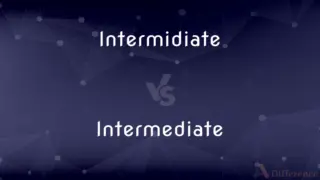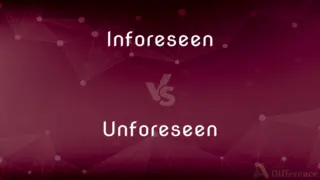Piligrim vs. Pilgrim — Which is Correct Spelling?
Edited by Tayyaba Rehman — By Fiza Rafique — Updated on March 27, 2024
"Piligrim" is an incorrect spelling. "Pilgrim" is the correct spelling referring to a person who travels on a religious journey.

Table of Contents
Which is correct: Piligrim or Pilgrim
How to spell Pilgrim?

Piligrim
Incorrect Spelling

Pilgrim
Correct Spelling
ADVERTISEMENT
Key Differences
Associate "Pilgrim" with "Plymouth," where the Pilgrims landed.
Recall the famous "Pilgrim Fathers" who sailed to America.
Visualize a Pilgrim's hat to recall the correct spelling.
Think of the word "grim" at the end to remember "Pilgrim."
There is only one 'i' between the 'P' and 'l' in "Pilgrim."
ADVERTISEMENT
How Do You Spell Pilgrim Correctly?
Incorrect: He considered himself a modern-day piligrim.
Correct: He considered himself a modern-day pilgrim.
Incorrect: The piligrim journeyed to the holy land.
Correct: The pilgrim journeyed to the holy land.
Incorrect: A piligrim must have strong faith and determination.
Correct: A pilgrim must have strong faith and determination.
Pilgrim Definitions
A person who journeys, especially long distances, for religious reasons.
Many pilgrims visit Jerusalem each year.
An individual who travels to a sacred place as an act of religious devotion.
He became a pilgrim to Mecca.
Someone on a journey of personal or moral significance, often in a foreign land.
As a pilgrim in India, she sought spiritual enlightenment.
One of the English colonists settling at Plymouth in 1620.
The Pilgrim Fathers established the Plymouth Colony.
A traveler or wanderer, especially in a foreign place.
He felt like a pilgrim in the bustling city.
A pilgrim (from the Latin peregrinus) is a traveler (literally one who has come from afar) who is on a journey to a holy place. Typically, this is a physical journey (often on foot) to some place of special significance to the adherent of a particular religious belief system.
A religious devotee who journeys to a shrine or sacred place.
A person who travels, especially to foreign lands or to a place of great personal importance.
Pilgrim One of the English Separatists who founded the colony of Plymouth in New England in 1620.
One who travels, especially on a journey to visit sites of religious significance.
(slang) A newcomer.
(historical) A silk screen formerly attached to the back of a woman's bonnet to protect the neck.
(intransitive) To journey; to wander; to ramble.
A wayfarer; a wanderer; a traveler; a stranger.
Strangers and pilgrims on the earth.
One who travels far, or in strange lands, to visit some holy place or shrine as a devotee; as, a pilgrim to Loretto; Canterbury pilgrims. See Palmer.
Of or pertaining to a pilgrim, or pilgrims; making pilgrimages.
To journey; to wander; to ramble.
Someone who journeys in foreign lands
One of the colonists from England who sailed to America on the Mayflower and founded the colony of Plymouth in New England in 1620
Some one who journeys to a sacred place as an act of religious devotion
Pilgrim Meaning in a Sentence
A true pilgrim seeks spiritual growth above all.
The journey of a pilgrim is often full of trials and tribulations.
In the life of a pilgrim, the journey is as important as the destination.
For a pilgrim, every step taken is a step closer to spiritual enlightenment.
Common Curiosities
What is the pronunciation of Pilgrim?
"Pilgrim" is pronounced as /ˈpɪlɡrɪm/.
Which vowel is used before Pilgrim?
The letter "i" is used before the "-grim" in "Pilgrim."
Why is it called Pilgrim?
The term "Pilgrim" is derived from Latin "peregrinus," meaning foreigner or traveler, often used for those traveling for religious reasons.
What is the root word of Pilgrim?
The root word is Latin "peregrinus," meaning foreigner or traveler.
What is the verb form of Pilgrim?
"Pilgrim" is a noun, and it doesn't have a verb form.
What is the plural form of Pilgrim?
"Pilgrims."
Is Pilgrim a negative or positive word?
"Pilgrim" is neutral; context determines its connotation.
What is the singular form of Pilgrim?
"Pilgrim."
Which preposition is used with Pilgrim?
"Of," as in "Pilgrim of Canterbury."
Which conjunction is used with Pilgrim?
Any conjunction can be used based on the context, e.g., "and," "but," "or."
Which article is used with Pilgrim?
Both "a" and "the" can be used, e.g., "a pilgrim" or "the pilgrims."
Is Pilgrim a noun or adjective?
"Pilgrim" is primarily a noun.
Is the word Pilgrim is imperative?
No, "Pilgrim" is not imperative.
Is the word Pilgrim is Gerund?
No, "Pilgrim" is not a gerund.
How many syllables are in Pilgrim?
There are two syllables in "Pilgrim."
What is the opposite of Pilgrim?
There's no direct opposite, but "resident" or "local" could be contrasting terms.
Is Pilgrim an abstract noun?
No, "Pilgrim" is a concrete noun.
Is Pilgrim a countable noun?
Yes, "Pilgrim" is a countable noun.
Is Pilgrim a collective noun?
No, "Pilgrim" is not a collective noun.
Is the Pilgrim term a metaphor?
It can be used metaphorically, especially when referring to someone on a spiritual or personal journey.
What part of speech is Pilgrim?
"Pilgrim" is a noun.
Which determiner is used with Pilgrim?
Determiners like "this," "that," "a," or "the" can be used based on context.
What is the first form of Pilgrim?
"Pilgrim" doesn't have verb forms as it is primarily a noun.
What is the third form of Pilgrim?
"Pilgrim" doesn't have verb forms.
Is Pilgrim a vowel or consonant?
"Pilgrim" is a word containing both vowels and consonants.
What is a stressed syllable in Pilgrim?
The first syllable "Pil" is stressed.
What is another term for Pilgrim?
Another term is "traveler" or "wanderer," especially in religious contexts.
What is the second form of Pilgrim?
"Pilgrim" doesn't have verb forms.
How is Pilgrim used in a sentence?
"The pilgrim traveled for months to reach the holy shrine."
Is Pilgrim an adverb?
No, "Pilgrim" is not an adverb.
Is the word “Pilgrim” a Direct object or an Indirect object?
It can be either, depending on the sentence.
How do we divide Pilgrim into syllables?
Pil-grim
Share Your Discovery

Previous Comparison
Crucifiction vs. Crucifixion
Next Comparison
Volume vs. VolumnAuthor Spotlight
Written by
Fiza RafiqueFiza Rafique is a skilled content writer at AskDifference.com, where she meticulously refines and enhances written pieces. Drawing from her vast editorial expertise, Fiza ensures clarity, accuracy, and precision in every article. Passionate about language, she continually seeks to elevate the quality of content for readers worldwide.
Edited by
Tayyaba RehmanTayyaba Rehman is a distinguished writer, currently serving as a primary contributor to askdifference.com. As a researcher in semantics and etymology, Tayyaba's passion for the complexity of languages and their distinctions has found a perfect home on the platform. Tayyaba delves into the intricacies of language, distinguishing between commonly confused words and phrases, thereby providing clarity for readers worldwide.




































